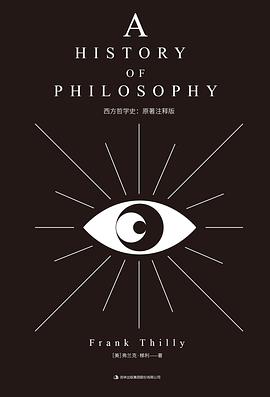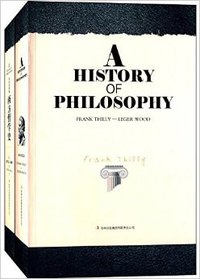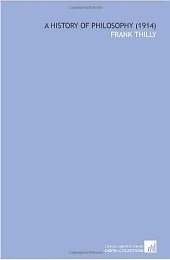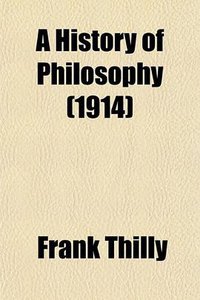西方哲学史:原著注释版
豆瓣
A History of Philosophy
[美]弗兰克•梯利
简介
本书为中英双语两本,以硬装盒装形式呈现。它是一部讲述西方哲学发展历程的著作,其雏形为梯利教授在大学任教时的讲义。此次出版,共有中英文两本。具体分为希腊哲学、中世纪哲学、近代哲学三编。往下又划分为自然哲学、知识和行为问题、重建时期、伦理运动、宗教运动、基督教和中世纪哲学的古典来源、经院哲学的形成期、文艺复兴时期的哲学、英国经验主义的开端、欧洲大陆的唯理论、启蒙运动哲学、康德的批判哲学、德国的唯心主义、黑格尔之后的德国哲学、法国和英国的哲学、法对理性主义和唯心主义等二十篇。篇下设章,讲述更为具体。文后附原书索引,便于读者检索细目。中文字数接近七十万,是一部规模宏大的哲学史著作。此次中英文两册一起出版,规模浩大,出版方特意延请业内的两位哲学博士共同翻译打造校准,力求让此选题更加精准、完善,让更多学人、哲学爱好者,一起了解并传播西方哲学。
-------------------------------------------------------------------------------------------
作者卓越:西方哲学发展史上无论古代中世纪还是近现代,百花齐放,名家辈出,其中梯利似乎并不独特,然而恰恰是他,写出了中西方学界公认的最公正、客观、全面的哲学史,其架构、论述类别、视角都独树一帜。
书籍经典:哲学史上第一部以讲义为基础、以史家宏观视角编写的哲学著作。影响深远。是学习哲学的人士案头必备工具书,与罗素的西哲史并驾齐驱,为哲学界之双璧。
译文优秀:本书为北京大学哲学博士贾辰阳和解本远二位专家联袂翻译打造,历时多年,殚精竭虑,译文考究,再三锤炼,摒弃旧式哲学类书晦涩艰深超过原文的通病,通俗,易懂,精准,同类书籍,无出其右。
contents
Contents
Introduction 1
PART ONE. GREEK PHILOSOPHY
I. Philosophy of Nature 7
1. ORIGIN AND DEVELOPMENT OF EARLY GREEK THOUCHT 7
History of Greek Philosophy — Environment— Politics
— Literature — Religious Origins of Greek Philosophy
— Survey of Greek Philosophy
2. DEVELOPMENT OF PRE-SOPHISTIC PHILOSOPHY 20
3. THE PROBLEM OF SUBSTANCE 23
Thales — Anaximander — Anaximenes — Pythagoras
and His School
4. THE PROBLEM OF CHANGE 31
Permanence and Change — Heraclitus — The Eleatic
School
5. QUALITATIVE THEORIES 40
Solution of the Riddle of Change — Empedocles —
Anaxagoras
6. QUANTITATIVE THEORIES 46
The Atomism of Democritus — Metaphysics and Cosmology
— Psychology and Theory of Knowledge
— Theology and Ethics
II. Problems of Knowledge and Conduct 52
7. THE AGE OF THE SOPHISTS 52
Progress of Thought — Greek Enlightenment — The
Sophists
8. SOCRATES AND THE SOCRATIC SCHOOLS 62
The Socratic Problem — The Socratic Method — The
Socratic Ethics — The Socratic Schools
III. The Age of Reconstruction 73
9. PLATO 73
Plato and His Problem — Dialectic and Theory of
Knowledge — Hierarchy of the Sciences — Doctrine of
Ideas — Philosophy of Nature — Cosmology — Psychology
— Doctrine of Immortality — Ethics — Politics —
Plato’s Historical Position — The Platonic School
10. ARISTOTLE 95
Aristotle’s Problems — Philosophy and the Sciences —
Logic — Metaphysics — The Four Causes — Theology
— Physics — Biology — Psychology — Ethics — Politics
— Aristotle’s Genius and Influence — Post-Aristotelian
Philosophy
IV. The Ethical Movement 120
11. THE OUTLOOK 120
12. EPICUREANISM 122
The Problem — Logic and Epistemology — Meta-
physics — Psychology — Ethics — Social and Political
Philosophy
13. STOICISM 130
Zeno and His School — Logic and Theory of Knowl-
edge — Metaphysics — Cosmology — Psychology —
Ethics — Politics — Religion — Résumé of Greek Ethics
14. SKEPTICISM AND ECLECTICISM 141
The Skeptical School — Doctrines of the School —
Later Skeptics — Eclecticism
V. The Religious Movement 145
15. JEWISH-GREEK PHILOSOPHY 145
Philosophy and Religion — Beginnings of Jewish-Greek
Philosophy — Philo
16. NEOPLATONISM 149
Pythagorean Sources of Neoplatonism — Neoplatonism
— Plotinus — Later Neoplatonism — Closing of the
School at Athens
PART TWO. MEDIEVAL PHILOSOPHY
VI. Christian and Classical Sources of Medieval Philosophy 159
17. TRANSITION TO MEDIEVAL PHILOSOPHY 159
Delimitation of the Medieval Period — The Patristic
Period
18. THE BEGINNINGS OF CHRISTIANITY 163
Early Christianity — Christianity and Classical Culture
19. THE DEVELOPMENT OF CHRISTIAN THEOLOGY 165
Early Theology — Gnostics — The Apologists — Teach-
ings of the Apologists — The Logos Doctrine — Free
Will and Original Sin
20. CHRISTIANITY AND CLASSICAL PHILOSOPHY 173
Christianity as a Creed — The School at Alexandria —
The Nicene Creed — The Background of St. Augustine
21. ST. AUGUSTINE 180
Theory of Knowledge — Theology — The Problem of
Evil — Psychology — Ethics — Freedom of the Will
22. SCHOLASTICISM: ITS NATURE AND PROBLEMS 188
The Meanings of “Scholasticism” — The Problems of
Scholasticism — Relation of Faith and Reason — Rela-
tion Of Will to Intellect — The Problem of Universals
VII. The Formative Period of Scholasticism 202
23. JOHN SCOTUS ERIGENA: A NEOPLATONIC REVERSION 202
Faith and Knowledge — Pantheism — Mysticism
24. THE BEGINNINGS OF THE CONTROVERSY OVER UNIVERSALS 204
Early Schoolmen — Roscelin’s Nominalism — The
Meaning of Realism
25. ANSELM OF CANTERBURY: THE FIRST SCHOLASTIC SYNTHESIS 207
Proofs for the Existence of God — Contemporaries of
Anselm
26. PETER ABELARD AND TWELFTH-CENTURY SCHOLASTICISM 209
The School of Chartres — The “Sentences” — John of
Salisbury
27. ANTI-SCHOLASTIC TENDENCIES IN THE TWELFTH CENTURY 213
Mysticism — Pantheism
28. SYMPTOMS OF UNREST 215
Opposition to Scholasticism — Organization of Learning
— Discovery of Aristotle
VIII. The Period of Maturity: The Thirteenth Century 218
29. ARABIAN PHILOSOPHY 218
Greek Sources — Conflicting Schools — Rationalists —
Downfall of Philosophy in the East — The Spanish
School — Jewish Philosophy
30. THE INFLUENCE OF ARISTOTLE 224
Scholasticism and Aristotle — Augustinian Theology —
Albertus Magnus
31. ST. THOMAS AQUINAS: THE CULMINATION OF SCHOLASTICISM 226
Philosophy and Theology — Theory of Knowledge —
Metaphysics — Theology — Psychology — Ethics —
Politics — Followers of St. Thomas
32. SOME ANTI-SCHOLASTIC TENDENCIES: MYSTICISM, PAN-
THEISM, AND NATURAL SCIENCE 237
Mysticism — Logic — Natural Science — The Doctrine
of the Twofold Truth — Raymond Lully
IX. Period of Decline: After the Thirteenth Century 241
33. JOHN DUNS SCOTUS 241
Opposition to St. Thomas — Faith and Knowledge —
The Doctrine of Universals — Theology — Psychology
— God and the Moral Law
34. THE REWVAL OF NOMINALISM 247
William of Occam — Nominalism vs. Realism — Fol-
lowers of Occam
35. FOURTEENTH-CENTURY MYSTICISM 250
Orthodox and Heretical Mystics — Meister Eckhart
36. THE PROGRESS OF SECULARISM AND FREE THOUGHT 253
Medieval Rationalism — The Rise of Nationalism —
Heretical Tendencies — The Spirit of Free Inquiry
PART THREE. MODERN PHILOSOPHY
X. Philosophy of the Renaissance 261
37. THE NEW ENLIGHTENMENT 261
Reason and Authority—Humanism
38. NEW PHILOSOPHIES 263
Platonism — Nicolas of Cusa — The True Aristotle —
Reform of Science, Philosophy, and Logic
39. PHILOSOPHY OF NATURE AND NATURAL SCIENCE 266
Occultism — Philosophy of Nature — The Scientific
Movement
40. GIORDANO BRUNO AND TOMMASO CAMPANELLA 271
Bruno — Campanella
41. NEW THEORIES OF THE STATE; PHILOSOPHY OF RELIGION;
SKEPTICISM 273
Scholastic Theory of the State — Machiavelli — The
New Politics — Evolution of the Modern State — Nat-
ural Religion of Herbert of Cherbury — Skepticism
42. RELIGIOUS REFORM 277
Spirit of the Reformation — Protestant Scholasticism —
Mysticism of Jacob Boehme
43. THE SPIRIT OF MODERN PHILOSOPHY 280
Characteristics of the Modern Era — Empiricism and
Rationalism
XI. The Beginnings of British Empiricism 285
44. FRANCIS BACON 285
The Reform of Science — Inductive Method — Program
of Philosophy — Philosophy of Man — Metaphysics and
Theology — Bacon as an Empiricist
45. THOMAS HOBBES 293
Aim and Method — Theory of Knowledge — Meta-
physics — Psychology — Politics
XII. Continental Rationalism 301
46. RENÉ DESCARTES 301
Descartes’ Problem — Classification of the Sciences —
Method and Criterion of Knowledge — Proofs of the
Existence of God — Truth and Error — Existence of
the External World — Relation of Mind and Body
Psychology of the Emotions — The Theory of Innate
Ideas
47. SUCCESSORS OF DESCARTES 314
Difficulties in Descartes’ Philosophy — Occasionalism —
Arnold Geulincx — The Idealism of Malebranche —
The Mysticism of Pascal — The Skepticism of Bayle
48. BENEDICT SPINOZA 319
Rationalism — Method — The Universal Substance —
Attributes of God — The Doctrine of Modes — The
Human Mind — Theory of Knowledge — Intellect and
Will — Ethics and Politics — Intellectual Love of God
XIII. The Development of British Empiricism 333
49. JOHN LOCKE 333
Locke’s Problem — Origin of Knowledge — Nature and
Validity of Knowledge — The Limits of Knowledge —
Metaphysics — Ethics — Free Will — Political Philos-
ophy — Theory of Education
50. LOCKE’S INFLUENCE 352
Extent of Locke’s Influence — Theological Influence —
Sensationalism and Associationism — Ethical Theory —
Economics Theory
51. GEORGE BERKELEY 358
Berkeley’s Problem — Rejection of Abstract Ideas —
To Be Is to Be Perceived — The World of Spirits —
Objections Answered — Knowledge of Ideas, Spirits,
and Relations — Refutation of Dualism, Atheism, and
Skepticism
52. DAVID HUME 367
Hume’s Problem — Science of Human Nature — Origin
of Knowledge — Relation of Cause and Effect — Validity
of Knowledge — Knowledge of the External World
— Denial of Soul-substance — Liberty and Necessity —
God — Voluntarism and Anti-intellectualism
53. THE RATIONALISTIC REACTION IN ENGLAND 381
Cambridge Platonism — The Scottish Common-sense
School
XIV. The Development of Rationalism in Germany 384
54. GOTTFRIED WILHELM LEIBNIZ 384
German Culture before Leibniz — The Problem — The
Doctrine of Force — The Doctrine of Monads —
Theology — Ethics — Logic and Theory of Knowledge
55. SUCCESSORS OF LEIBNIZ 398
Christian Wolff — Mysticism and Romanticism
XV. The Philosophy of the Enlightenment 401
56. THE EIGHTEENTH CENTURY 401
Voltaire
57. PROGRESS OF THE ENLIGHTENMENT 403
The Enlightenment in England — The German Enlightenment
— Materialism and Evolutionism —
Progress in the Sciences — Jean Jacques Rousseau
XVI. The Critical Philosophy of Immanuel Kant 410
58. IMMANUEL KANT 410
Kant’s Heritage from His Predecessors — Kant’s Problem
— The Problem of Knowledge — The Transcendental
Method — Preliminary Analysis of Experience —
The Theory of Sense Perception — The Theory of the
Understanding — Validity of Judgment — The Unity
of Self-consciousness — Knowledge of Things-in-themselves
— Impossibility of Metaphysics — Use of Meta-
physics in experience — Use of Teleology in Nature —
Practical Use of Reason and Moral Theology — Ethics
59. SUCCESSORS OF KANT 445
Problems Raised by Kant — Idealism and the Thing-
in-itself — Herder — Jacobi
XVII. German Idealism 450
60. JOHANN GOTTLJEB FICHTE 450
Post-Kantian Philosophy — Fichte’s Principle — Aim
and Method of the Science of Knowledge — Knowledge
of the Ego — The External World — Objective
Idealism — Moral Philosophy — The New Idealism and
Romanticism
61. FRIEDRICH WILHELM SCHELLING 466
Philosophy of Nature — Philosophy of Mind — Logic
and Intuition
62. FRIEDRICH SCHLEIERMACHER 473
Philosophy of Religion — Knowledge and Faith — God,
the World, and the Individual
63. GEORG WILHELM HEGEL 476
Hegel and His Predecessors — The Problem of Philosophy
— The Dialectical Method — Thought and Being
— Logic and Metaphysics — Philosophy of Nature and
Philosophy of Mind — Philosophy of Right — Art, Religion,
and Philosophy — Hegelian Schools
XVIII. German Philosophy after Hegel 490
64. THE REALISM OF JOHANN FRIEDRICH HERBART 490
Opposition to Hegelianism — Realistic Conception of
Philosophy — Metaphysics — Psychology — The Science
of Values
65. SCHOPENHAUER 496
The World as Will and Idea—Will in Nature and in
Man — Pessimism — Ethics of Pity and Self-denial —
Von Hartmann’s Philosophy of the Unconscious
66. NIETZSGHE 501
Nietzsche’s Predecessors —“The Will to Power” —
The Eternal Recurrence — Attack on Christianity —
The Function of Reason- Metaphysics and Epistemology
— Nietzsche’s Influence
67. NATURAL SCIENCE AND MATERIALISM 507
Reaction against Speculative Philosophy — Materialism
68. THE REVIVAL OF IDEALISM IN GERMANY 509
Neo-Kantianism — Revival of Criticism — Lotze —
Fechner — Wundt — The Philosophies of Value —
Windelband — Eucken
XIX. Philosophy in France and England 518
69. POSITIVISM AND ITS OPPONENTS IN FRANCE 518
Reaction against Sensationalism — Saint-Simon —
Comte — Idealistic Opposition to Positivism — Renouvier
— Fouillée
70. SCOTTISH RATIONALISTIC PHILOSOPHY 526
Whewell — Hamilton
71. THE EMPIRICISM OF JOHN STUART MILL 529
Empiricism and Positivism — Science and Social Reform
— Logic — Inductive Inference — Warrant of Induction
— The Law of Causation — Rejection of a priori
Truths — The External World and the Self — Reform
of the Mental and Moral Sciences — Psychological
Determinism — Ethology — Social Science — Ethics
72. THE EVOLUTIONISM OF HERBERT SPENCER 545
The Ideal of Knowledge — Relativity of Knowledge —
Persistence of Force — Mind and Matter — The Law
of Evolution — Biology — Psychology — The External
World — Ethics — Politics
73. THE NEW IDEALISM IN ENGLAND AND THE UNITED STATES 557
The Influence of German Idealism — Thomas Hill
Green — F. H. Bradley — Royce
XX. Reaction against Rationalism and Idealism 569
74. ROMANTIC REACTION AGAINST RATIONALISM 569
Merits of Anti-intellectualism — Tacit Appeal to Reason
— Dangers of Extreme Rationalism — Protests against
the Block Universe — Intellect and Intuition
75. EXISTENTIALISM IN GERMANY 578
The Discovery of Kierkegaard — The Existential-
ism of Heidegger and Jaspers — The Significance of
Existentialism
76. SCIENTIFIC CONVENTIONALISM AND FICTIONALISM 585
Mach — Avenarius — Vaihinger’s Fictionalism — Poin-
caré’s Conventionalism — Recent Positivistic Tendencies
77. PRAGMATISM 597
C. S. Peirce’s Pragmatic Principle — James’ Pragmatism
— Dewey’s Instrumentalism and Experimentalism
78. THE INTUITIONISM OF HENRI BERGSON 615
Intellect and Intuition — Metaphysics
79. THE DEVELOPMENT OF GERMAN PHENOMENOLOGY 618
Brentano’s “Intentional” Psychology — Meinong’s
Theory of Objects — Husserl’s Phenomenology
80. RECENT BRITISH REALISM 623
G. E. Moore — Bertrand Russell — Samuel Alexander —
A. N. Whitehead
81. RECENT AMERICAN REALISM 635
New Realism — Critical Realism
Index 641








